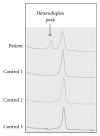Herbal Medicine Containing Licorice May Be Contraindicated for a Patient with an HSD11B2 Mutation
- PMID: 20007258
- PMCID: PMC3136776
- DOI: 10.1093/ecam/nep211
Herbal Medicine Containing Licorice May Be Contraindicated for a Patient with an HSD11B2 Mutation
Abstract
Licorice ingestion, as well as mutations in the HSD11B2 gene, inhibits 11β-hydroxysteroid dehydrogenase type 2 (11βHSD2) enzyme activity, causing the syndrome of apparent mineral corticoid excess (AME). However, the combined effect of licorice ingestion and an HSD11B2 mutation has never been reported, until now. In this study, we demonstrated that licorice ingestion can produce overt hypertension in an individual without medical history of hypertension who is heterozygous for wild-type and mutant HSD11B2 genes. Our patient was a 51-year-old female with serious hypertension who had been taking herbal medicine containing licorice for more than one year. She was clinically diagnosed as having licorice intoxication, because she did not present with hypertension after ceasing the herbal medicine. Molecular analysis showed that she carried a missense mutation, c.40C>T, in HSD11B2. In conclusion, licorice ingestion is an environmental risk factor for hypertension or AME state in patients with a mutation in HSD11B2. Carrying a mutation in HSD11B2 is, conversely, a genetic risk factor for licorice-induced hypertension or AME state. Herbal medicine containing licorice may, therefore, be contraindicated in patients with an HSD11B2 mutation.
Figures



Similar articles
-
Apparent mineralocorticoid excess caused by novel compound heterozygous mutations in HSD11B2 and characterized by early-onset hypertension and hypokalemia.Endocrine. 2020 Dec;70(3):607-615. doi: 10.1007/s12020-020-02460-9. Epub 2020 Aug 20. Endocrine. 2020. PMID: 32816205 Free PMC article.
-
Clinical, genetic, and structural basis of apparent mineralocorticoid excess due to 11β-hydroxysteroid dehydrogenase type 2 deficiency.Proc Natl Acad Sci U S A. 2017 Dec 26;114(52):E11248-E11256. doi: 10.1073/pnas.1716621115. Epub 2017 Dec 11. Proc Natl Acad Sci U S A. 2017. PMID: 29229831 Free PMC article.
-
Apparent Mineralocorticoid Excess by a Novel Mutation and Epigenetic Modulation by HSD11B2 Promoter Methylation.J Clin Endocrinol Metab. 2015 Sep;100(9):E1234-41. doi: 10.1210/jc.2015-1760. Epub 2015 Jun 30. J Clin Endocrinol Metab. 2015. PMID: 26126204
-
Late-onset apparent mineralocorticoid excess caused by novel compound heterozygous mutations in the HSD11B2 gene.Hypertension. 2003 Aug;42(2):123-9. doi: 10.1161/01.HYP.0000083340.57063.35. Epub 2003 Jul 14. Hypertension. 2003. PMID: 12860834
-
The role of 11β-hydroxysteroid dehydrogenase type 2 in human hypertension.Biochim Biophys Acta. 2010 Dec;1802(12):1178-87. doi: 10.1016/j.bbadis.2009.10.017. Epub 2009 Nov 10. Biochim Biophys Acta. 2010. PMID: 19909806 Review.
Cited by
-
Biological insights and therapeutic potential of Glycyrrhiza uralensis and its bioactive compounds: an updated review.Arch Pharm Res. 2024 Dec 3. doi: 10.1007/s12272-024-01522-0. Online ahead of print. Arch Pharm Res. 2024. PMID: 39625590 Review.
-
The anti-inflammatory activity of licorice, a widely used Chinese herb.Pharm Biol. 2017 Dec;55(1):5-18. doi: 10.1080/13880209.2016.1225775. Epub 2016 Sep 21. Pharm Biol. 2017. PMID: 27650551 Free PMC article. Review.
-
Electrical storm induced by hypokalemia associated with herbal medicines containing licorice.Transl Clin Pharmacol. 2019 Jun;27(2):69-72. doi: 10.12793/tcp.2019.27.2.69. Epub 2019 Jun 28. Transl Clin Pharmacol. 2019. PMID: 32055584 Free PMC article.
References
-
- White PC, Mune T, Agarwal AK. 11β-Hydroxysteroid dehydrogenase and the syndrome of apparent mineralocorticoid excess. Endocrine Reviews. 1997;18:135–156. - PubMed
-
- Stewart PM, Valentino R, Wallace AM, Burt D, Shackleton CHL, Edwards CRW. Mineralocorticoid activity of liquorice: 11-beta-hydroxysteroid dehydrogenase deficiency comes of age. The Lancet. 1987;2(8563):821–824. - PubMed
-
- MacKenzie MA, Hoefnagels WH, Jansen RW, Benraad TJ, Kloppenborg PW. The influence of glycyrrhetinic acid on plasma cortisol and cortisone in healthy young volunteers. Journal of Clinical Endocrinology & Metabolism. 1990;70:1637–1643. - PubMed
Publication types
LinkOut - more resources
Full Text Sources

